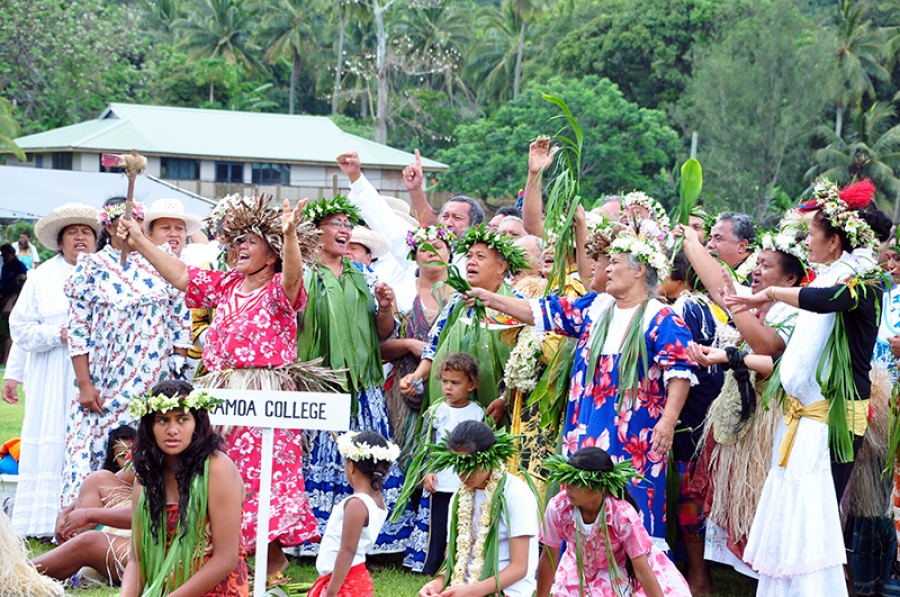The strength of Christianity in the Cook Islands
Monday 25 October 2021 | Written by Ruta Tangiiau Mave | Published in Opinion

Gospel Day is a joyous and exciting holiday for the Cook Islands, with high-spirited dramas and singing presented by members of the local church community. 17102428
On August 26, 1821, the Reverend John Williams of the London Missionary Society (LMS) arrived on the shores of Aitutaki and together with his disciple and interpreter Papeiha brought Christianity to the people of Aitutaki.
The missionaries were not the first to find the islands, Captain Cook arrived in 1773 and 1777 navigating and mapping most of the group, surprisingly, he never sighted Rarotonga and he only personally set foot on a tiny uninhabited atoll of Palmerston. He originally called the group of islands the Hervey Islands to honour a British Lord of the Admiralty. It was half a century later that a Russian Baltic German Admiral Adam Johannn von Krusenstern who published the Atlas de l’Ocean Pacifique, renamed the Hervey Island to the Cook Islands in honour of Captain Cook.
The surprising success of Christianity in Aitutaki led Williams to look for the large island of Rarotonga. They spent the next two years bouncing around the islands of Mangaia, Mitiaro, Mau’uke and Atiu. It wasn’t until an Atiuan ariki who had invaded Rarotonga on several occasions gave the missionaries directions and they landed in 1823. Rarotonga became the LMS main base, and Reverend John Williams spent several years preaching along with another missionary called Aaron Buzacott. If you turn left past the Justice building roundabout and head towards the mountains you will see a white monument as a small roundabout – it is here that the first sermon by Papeiha was held in 1823.
Christianity converted the local people from their worship of 60 plus gods, for rain, fishing, fertility or war to the recognition and acceptance of one peaceful God. The acceptance of a peaceful God by all tribes allowed a truce whereby they could leave their mountainous fortresses to live alongside each other on the flat and fertile lands in relative harmony without losing their mana. Previously, the concept of compromise or negotiation was seen as a weakness and a loss of status, accepting a peaceful God they accepted a peaceful life retained their mana. They have celebrated such with the annual recognition of Gospel Day on October 26th as a public holiday where churches choreograph large performances to a different theme each year, and tomorrow the 200th year celebration in Aitutaki promises to be sensational. Hundreds are going to attend, hundreds more will watch and pray from afar due to travel restrictions.
Many tourists question the arrival of Christianity eventuating in the loss of our traditional ways, the burning of maraes, statues and the changes to our traditional island way of life and laws. They go to cultural village tours to learn more and lament the fact that the modern world has taken over the islands so completely. More so they often see the arrival of Christianity as similar to pilgrims in America and the bloodshed of the Spanish inquisition of South America. Our story was different, we still suffered losses in language and laws, but to some extent the later arrival of Europeans bodes better for us as it seemed they learnt lessons from the settlement of New Zealand Maori lands, resulting in beneficial approaches for our islands. Certainly, not a perfect system, but a larger percentage of population sing praises to the Lord and Christianity more often than not.
The strength of Christianity in the Cook Islands is seen daily. A Pure or prayer is offered before every meal in private and public, at board meetings and sports competitions. Sunday is a day of rest and manual work and noisy garden work is frowned on. It’s not uncommon to have a mama tap you on the shoulder and ask if you’re a Christian if they see you working on a Sunday. The bells toll as early as 6am on a Sunday, people, families, children are dressed in their Sunday best to worship under the roof of God, some built by the missionaries using limestone coral from the lagoon still stand today. Clothing is encouraged towards the demure and covered where walking around town in a bikini is not acceptable and even on our beaches a mama can be seen chastising young tourists for sunbathing topless in public. We were saved from war and fighting by the missionaries and their one peaceful God, and we began to live peacefully.
Nowadays in Rarotonga, you will see several different denominations and religions, the CICC Cook Island Christian Church in the limestone buildings, formed by the LMS, is Protestant faith, Roman Catholic, Seventh day Adventist, Jehovah Witness, Latter day Saints, Assembly of God, Mormon, Apostolic Church and others, some with names like The Rock, or Wave Church. Bahai, Jewish and Muslim faiths are also found and followed by residents.
The celebration of Christianity is endemic here, it’s not for everyone, but work free, lazy Sunday is a religion I can recommend.




































